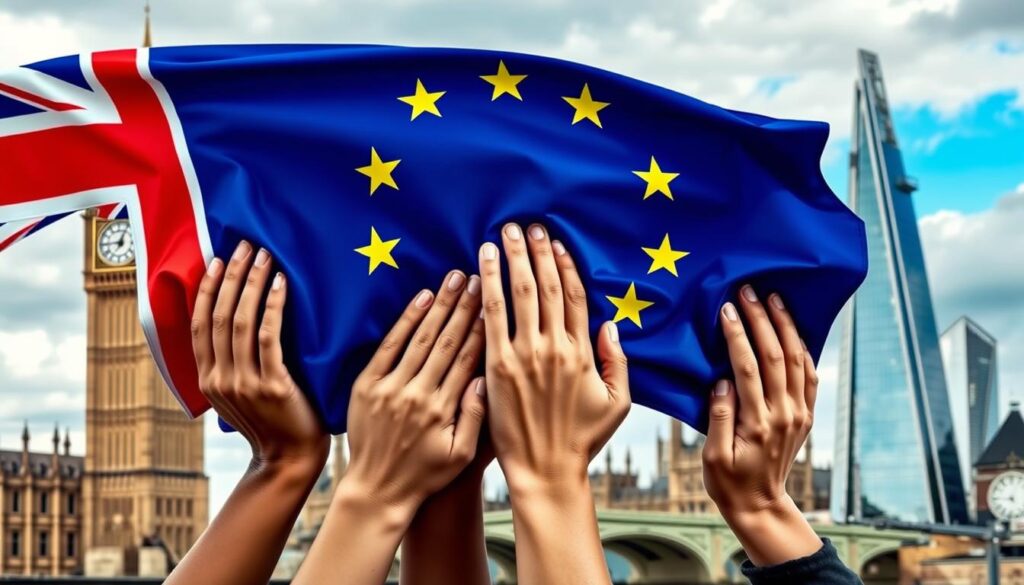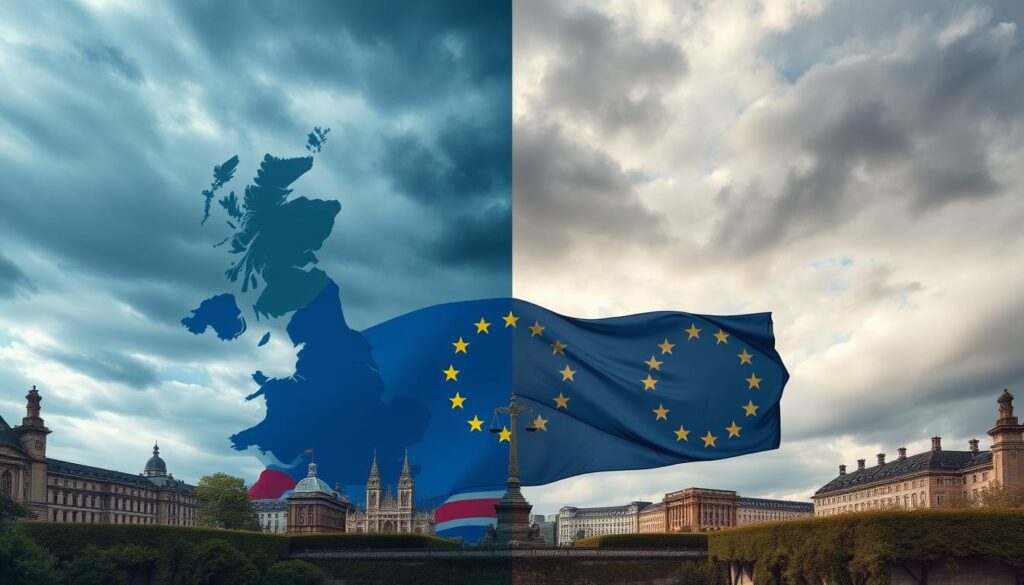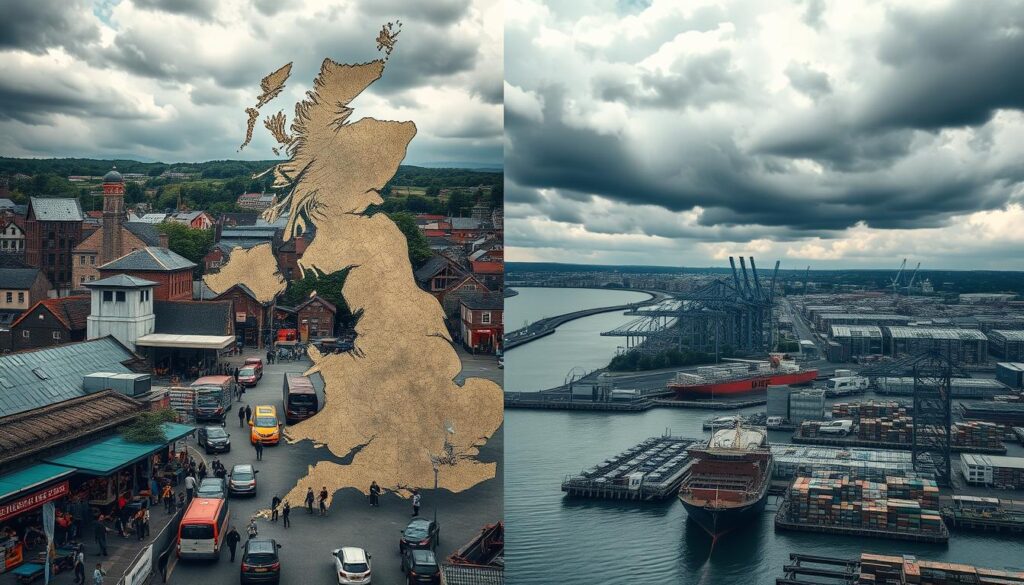The United Kingdom’s choice to leave the European Union, known as Brexit, has brought about a new era of change and uncertainty. As the UK moves forward, it faces many challenges in the economy, politics, and society. These challenges will shape its future for years to come.
After this historic decision, the UK is dealing with the effects of leaving the EU. It must renegotiate trade agreements, navigate complex rules, and adjust immigration policies and the economy. The UK’s relationship with the EU has changed, and both sides must find a new way to work together.
Citizens and businesses in the UK are facing the reality of life outside the EU. The value of the pound is changing, trade patterns are shifting, and the future of industries like finance and tourism is uncertain. The UK’s exit from the EU has also increased political tensions, leading to debates on Scottish independence and the Northern Ireland protocol.
The global effects of Brexit are being felt, influencing international trade, investment, and politics. The world is watching as the UK navigates this new territory. The decisions made will have big impacts on the UK, its neighbors, and the global economy.
Key Takeaways
- The UK’s decision to leave the European Union has significantly altered the country’s political, economic, and social landscape.
- The UK is faced with the complex task of renegotiating trade agreements, navigating regulatory environments, and addressing the impact on immigration and the economy.
- The UK’s relationship with the EU has been fundamentally changed, requiring both parties to forge a new partnership.
- Political tensions have heightened, with debates over Scottish independence and the Northern Ireland protocol adding to the country’s constitutional challenges.
- The global impact of Brexit is far-reaching, shaping international trade, investment, and geopolitical dynamics.
Post-Brexit Economic Landscape
The UK is changing its economic scene after Brexit. It’s now focusing on making new trade deals with the EU and other countries. This journey comes with both chances and hurdles.
Trade Agreements and Tariffs
Leaving the EU customs union means the UK must find new trade rules. It’s working on deals to lower tariffs and simplify customs for businesses and shoppers. But, these talks are tricky, and the results are still up in the air.
Financial Markets and Currency Fluctuations
Brexit has shaken the UK’s financial world and currency values. The pound’s ups and downs affect imports, exports, and the UK’s market strength. Investors and companies are watching these changes closely, trying to make the most of the new economic scene.
| Indicator | Pre-Brexit | Post-Brexit |
|---|---|---|
| Pound Sterling Exchange Rate (vs USD) | 1.50 | 1.35 |
| FTSE 100 Index | 7,400 | 6,800 |
| UK GDP Growth Rate | 2.1% | 1.6% |
The table shows how Brexit has affected important economic signs like the exchange rate, stock market, and GDP growth. These changes affect businesses, shoppers, and the UK-EU trade ties a lot.
“The economic consequences of Brexit are still unfolding, and businesses must remain agile and adaptable to navigate this uncertain landscape.”
Political Consequences of Brexit
The UK’s choice to leave the EU has caused big political changes. These changes are still affecting the country. Debates on sovereignty and constitutional changes are getting more heated.
UK Constitutional Changes
One big effect of Brexit is the chance for more devolution or even independence in the UK. The idea of Scotland becoming independent is getting stronger. The Scottish National Party (SNP) wants another vote on this.
The UK’s constitution is still up in the air. Political tensions are high about who has power in Scotland, Wales, and Northern Ireland. As the UK deals with Article 50 and the transition period, these changes will keep shaping British politics.
- The potential for further Scottish independence movements
- Debates around UK sovereignty and the UK constitution
- The role of Boris Johnson and Theresa May in UK unity efforts
- The impact of Brexit on the political tensions within the UK
As the UK deals with Brexit’s political implications, debates on sovereignty and constitutional changes will keep being important. They will shape the future of the United Kingdom.
Brexit Impact on Immigration and Labor
The United Kingdom’s decision to leave the European Union has changed its immigration policies and labor market. The UK is now outside the EU, ending the free movement of people. This was a key part of being in the EU.
Now, the UK’s new immigration policies limit EU citizens entering the country. Visa and work permit rules are stricter. This makes it harder for foreign workers to find jobs in the UK. Industries like healthcare, hospitality, and agriculture are affected.
The rights of EU citizens already in the UK are still unclear. The UK government’s approach to managing migration is debated. Some people support stricter immigration rules, while others want more freedom.
As the UK adjusts to its new status, finding the right balance is key. Policymakers must address labor shortages and attract global talent. The effects of these changes will shape the UK’s workforce and economy for years to come.
The Changing Landscape of EU Citizens’ Rights
One big issue after Brexit is the uncertainty for EU citizens in the UK. The “EU Settlement Scheme” lets them stay, but it’s complex. Some EU nationals might face challenges.
| Settled Status | Pre-Settled Status |
|---|---|
| Granted to EU citizens who have lived in the UK for at least 5 continuous years | Granted to EU citizens who have lived in the UK for less than 5 continuous years |
| Provides indefinite leave to remain in the UK | Requires re-application for “settled status” after 5 years of continuous residence |
| Allows for travel to and from the UK without restriction | Allows for travel to and from the UK for up to 2 years without losing pre-settled status |
The uncertainty about EU citizens’ rights worries many. It could affect skilled workers and key industries. This might harm the UK’s labor market.

“The future of the UK’s immigration policies and their impact on the labor market will be a critical factor in determining the country’s economic trajectory in the post-Brexit era.”
Regulatory Divergence from the EU
The United Kingdom is changing its rules after leaving the European Union. This change affects many areas, like businesses, the environment, and how we protect consumers. Now, companies must follow new rules in the UK, and lawmakers are figuring out how to balance these changes with keeping standards high.
Industry-Specific Regulations
The UK is making new rules for different industries. This means companies in finance and manufacturing have to follow new guidelines. It’s a big change, but it also brings new chances for growth and improvement.
Environmental and Consumer Protection Standards
Changes in rules also affect how we protect the environment and consumers. The UK wants to keep strong protections but also make its own decisions. People are watching how these policies evolve, especially in areas like pollution and product safety.
| Regulatory Aspect | EU Approach | UK Approach |
|---|---|---|
| Financial Services | Unified EU regulations (e.g., MiFID II, GDPR) | Tailored UK regulations (e.g., FCA Handbook, UK GDPR) |
| Environmental Protection | Ambitious EU climate targets (e.g., Green Deal) | Developing independent UK environmental policies |
| Consumer Rights | Comprehensive EU consumer protection laws | Adapting EU-derived consumer laws to UK context |
The UK’s move away from the EU brings both challenges and chances. Everyone is watching how these changes shape the future. This includes how industries grow, how we protect the environment, and how we look after consumers.

Brexit Aftermath: The UK-EU Relationship
The UK leaving the European Union has changed how the two work together. Now, they’re focusing on what their future relationship will look like. They’re also dealing with the tough parts of post-Brexit talks.
Future Trade Negotiations
Trade talks between the UK and the EU are key. They aim to make a deal that lets goods and services move freely. This is important to keep things running smoothly between them.
These talks are hard because both sides want to protect their interests. They also want to keep their economies stable.
Cooperation on Security and Defense
The UK and the EU are also working on security and defense. They want to keep sharing intelligence and working together on military and counterterrorism efforts. This is important for everyone’s safety.
As the UK and the EU move forward, they face both challenges and chances. Finding a balance between being independent and working together is crucial. This will help them have a stable and prosperous future.
| Aspect | UK Position | EU Position |
|---|---|---|
| Trade Negotiations | Seeking a comprehensive free trade agreement with minimal tariffs and barriers | Prioritizing the integrity of the single market and maintaining a level playing field |
| Security Cooperation | Keen to maintain strong intelligence sharing and joint operations | Recognizing the importance of security cooperation but wary of granting the UK unfettered access |
“The UK-EU relationship will continue to evolve, shaped by the outcome of these crucial negotiations. Finding the right balance between sovereignty and cooperation will be essential for safeguarding the interests of both parties.”
Global Impact of Brexit
The United Kingdom’s decision to leave the EU has big effects worldwide. It changes how countries trade with each other. These changes affect many places, not just the UK.
Implications for International Trade
The UK-EU trade relations have changed a lot. Now, there are new trade agreements, tariffs, and customs regulations. These changes have upset global trade patterns.
Businesses everywhere are watching how Brexit affects them. They are trying to understand the economic forecasts and business implications of this big change.
Brexit’s effects are far-reaching. Countries that used to trade closely with the UK are looking for new partners. This could change global trade dynamics a lot.
- The UK and its partners are working hard to update trade agreements. They want to keep good economic ties.
- Dealing with tariffs and customs regulations is hard for businesses. It can make things more expensive and harder to manage.
- The future of the UK and its trading partners is still unclear. The full impact of Brexit is still being felt.
The world is adjusting to the new UK-EU trade relations after Brexit. Finding ways to work together and plan ahead is key. The global impact of Brexit will keep shaping international trade for a long time.
Public Opinion and Unity in the UK
The UK is facing deep divisions since Brexit. The public opinion split between Leavers and Remainers is affecting the country’s politics. This is a big challenge to the UK unity.
The gap between Leavers and Remainers has grown since 2016. Leavers believe leaving the EU was the right choice, despite the political tensions and economic problems. Remainers, on the other hand, feel their views were ignored and the country’s future is uncertain.
The Ongoing Divide
This deep divide shows up in many ways. It’s seen in political debates, protests, and even talks of Scottish independence and the Northern Ireland protocol. The lack of agreement makes it hard for the government to lead the country after Brexit.
“The divide between Leavers and Remainers has become a defining feature of British politics, hampering efforts to unify the country and address the pressing challenges ahead.”
The UK needs to come together after Brexit. It’s vital for public opinion to find common ground. Closing the gap between Leavers and Remainers is key to UK unity and facing future challenges.
Future Outlook and Challenges
The United Kingdom is facing a new era after Brexit. This path will bring both chances and hurdles. The journey ahead demands smart planning, toughness, and a readiness to adjust to changing economic and political scenes.
Securing good trade deals with the European Union and other countries will be a big challenge. The UK must find a balance between wanting to be independent and needing trade agreements. It will need to negotiate well and be open to compromise to make new friends and update old deals.
The economic outlook for the UK is hopeful, but businesses must be ready for the unknown. Changes in currency, rules, and investment patterns will require quick thinking and planning. Leaders will have to create plans that boost growth, draw in investors, and help local businesses face these issues.

